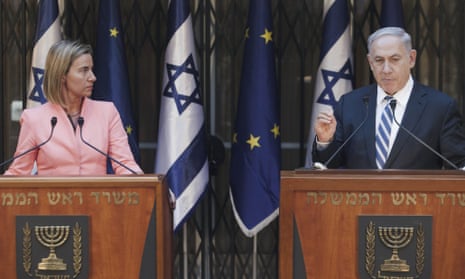A UN security council resolution being drafted by France and New Zealand plans to set an 18-month deadline for completion of talks leading to the creation of a Palestinian state.
Details of the draft resolution – disclosed to the French newspaper Le Figaro – emerged on Thursday amid warnings that if no agreement was reached in that timeframe, France would go ahead and unilaterally recognise a Palestinian state.
Pressure appears to be mounting on Israelis and Palestinians, not least from Europe, to return to the negotiating table after a damaging hiatus in the peace process of more than a year.
According to sources familiar with the resolution, however, it is unlikely to be tabled until after the end of negotiations between Tehran and world powers over a deal on Iran’s nuclear programme – due to be completed by 30 June – and probably not before September.
Details of the resolution emerged as the Israeli prime minister, Binyamin Netanyahu, met the Europoean Union foreign policy chief, Federica Mogherini. He restated his purported commitment to a two-state solution, having told voters earlier this year that no Palestinian state would be established on his watch.
Netanyahu had been warned by the visiting Norwegian foreign minister, Børge Brende, on Wednesday to expect a fresh wave of international pressure over making substantive progress towards a two-state solution once the Iran deadline ha dpassed.
While it was known that France had been working on a resolution since the failure of the last effort to pass a resolution on the issue, the leaking of its contents appears designed to put pressure on Netanyahu’s new rightwing government – in which opponents of a two-state solution hold prominent positions – to return to talks.
Netanyahu’s commitment to a two-state solution has been questioned, not least by US officials, who have refused to accept his assurances that his comments during Israel’s elections in March did not mean he had abandoned it.
In his meeting with Mogherini, Netanyahu used the opportunity “to reiterate Israel’s commitment to peace, and my commitment to peace”.
“We want a peace that would end the conflict once and for all,” he said. “My position has not changed: I don’t support a one-state solution – I don’t believe that’s a solution at all. I support the vision of two states for two peoples – a demilitarised Palestinian state that recognises the Jewish state.”
However, observers have remarked on Netanyahu’s appointment of Silvan Shalom to lead any negotiations with the Palestinians, a figure who in the past has been very public in his opposition to Palestinian statehood.
Netanyahu’s remarks were also quickly discounted by the chief Palestinian negotiator, Saeb Erekat, in a statement released by his office.
“It is not about Mr Netanyahu’s public relations skills claiming that he supports a two-state solution, but about his actions,” said Erekat. “The new Israeli cabinet has shown its commitment to consolidate an apartheid regime in occupied Palestine, as well as to continue its incitement campaign against Palestinians, sending the message that Palestinian lives, history and culture don’t matter.
“The international community has allowed Israel to stall the prospects of a just and lasting peace for too long and has a responsibility to face Netanyahu’s hypocrisy head on, and not at the expense of the Palestinian people. We call on the international community to do nothing more than demand Israel fulfill its obligations under international law.”
